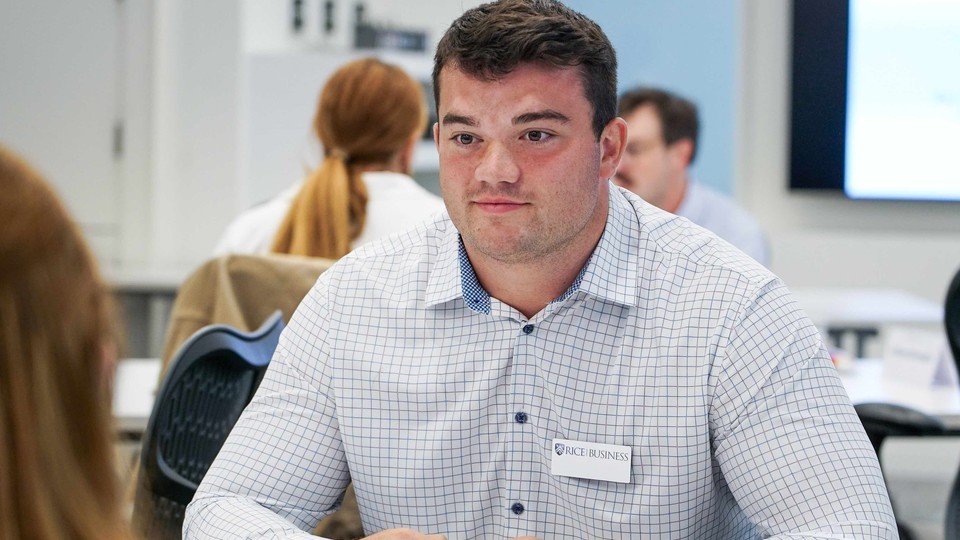You Can Do The Hard Things

I'm a big fan of [solidcore], which is a Pilates-style workout class that targets muscle failure; mind over matter, you're stronger than you think. The reason? Anything worth doing shouldn't come easy — we have to challenge ourselves to feel good about our accomplishments. Pushing ourselves to the brink of failure, sometimes even falling over the edge, is part of what makes us feel alive. We can do hard things.
How do we push our minds to the same limit in our daily lives at work? From kindergarten to college graduation, students are sponges for information. We spend our time constantly learning, contemplating complex ideas and evolving. This learning may even continue into the first few years of our working careers, where we often feel tossed into the deep end, treading water just to breathe. But what happens in year three or year four? We start to hit our stride and become comfortable, our work becoming rote and manageable — in short, we get bored. For many of us, a job change seems like the logical solution to this problem, and millennials are no strangers to job hopping. A different company or new industry glimmers with shiny new-ness to distract us from our boredom and give us something new to learn. Yet a few years later we may find ourselves in the same situation, yearning for something different.
One of the keys to professional success is to return to that "sponge" state, absorbing information and harnessing the power of our minds to effect change within the bureaucratic red tape that envelopes corporate America. This year, the company that I work for started offering a $10,000 annual budget for professional development per employee, which admittedly, is A LOT. But my company has a strategy:
- Employees are most productive when they are satisfied with their work
- People are satisfied with their work when they are challenged
- People challenge themselves when they are presented the opportunity to learn about things they care about
The spend is worth it.
Interested in Rice Business?
For my participation in the professional development program, I elected to allocate my funds toward tuition in the Professional MBA program at Rice. The true story of how I ended up here is because my eyelash technician mentioned the Rice MBA program offhand after listening to me prattle on about energy markets (bless her for putting up with me) week after week. One afternoon she finally said, "you know, you should really think about getting your MBA. What about Rice?" I went home that evening and started reflecting on all the reasons why a Rice MBA might actually make sense. I thought of all the people I've worked with whom I admire and whose jobs I covet; most of them have MBAs. Of course, I've always had a love for learning (if you can't tell by the theme of this article), and it was certainly appealing to get the opportunity to be back in the classroom. On top of that, my background is in chemistry and mathematics, so formal education in the subjects I didn't cover in undergrad, like accounting and finance, would shore up and round out my academic experience.
There were also other reasons in the back of my mind, ones that are less popular to talk about. I'm a woman in a male dominated industry. I'm young, and I have aspirations to build a company in the clean tech world. Some of the things I want to accomplish may be significantly harder without the degree. Of course, you get a great education and build your network at Rice, but the actual diploma would be an additional piece of leverage as I navigate through the world of venture capitalists and private equity. It's a signal of competence and grit, and sometimes demonstrating those qualities through work experience alone isn't enough. The diploma is validation, and I recognized that it may be more necessary for me than my male counterparts, as much as it pains me to write. Being an entrepreneur has its challenges, but being a woman entrepreneur in a male dominated industry requires constant corroboration of your value. Just as I use my undergraduate degree as a signal for my technical competence, the MBA signals business acumen. The simple truth is: the MBA will help.
After mulling it over for a few weeks, I was struggling to come up with reasons why I shouldn't go for an MBA. I ended up taking the GMAT because I was just shy of the work experience requirement for the waiver, and I actually recommend taking the test if you can. It gives you a good sense of what it's like to come home from work and study, which is what life is like during the PMBA program. I went to a few events on campus, garnered support from family, friends and work, and submitted my application in early spring.
Cut to the fall, and I've once again become a sponge. Arguably one of the biggest benefits of the PMBA program is that the concepts you learn in class are immediately applicable to your career (seriously, two weeks into accounting I got an email at work from our controller asking for clarification on a cost of goods sold adjustment). Aside from coursework, some of the most profound learning moments will come from your cohort — there are very few environments where you are free to discuss practical strategic decision-making across such a wide array of industries and experience levels. You'll do some mental gymnastics (or Pilates), and push yourself to your mental limits, but the reward is forthwith and tangible.
The MBA program at Rice is engineered to turn you into a life-long learner. The concept of workplace boredom will evaporate as your "sponge" state becomes your steady-state, and you'll forever challenge yourself with solving complex problems that you care about. #AdmitIt, and become a Rice MBA because you can do hard things.


